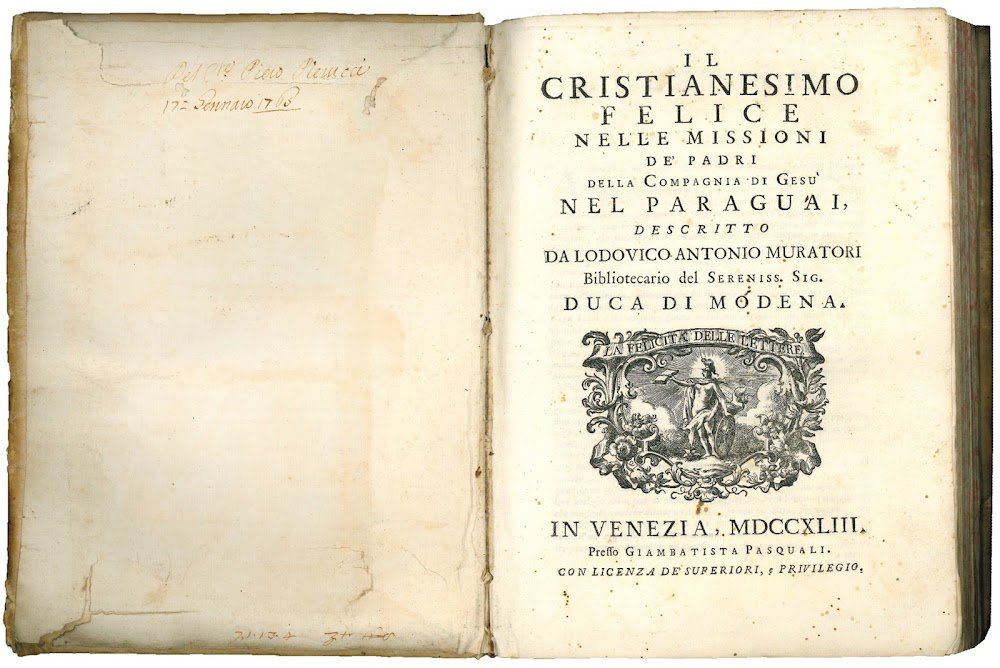
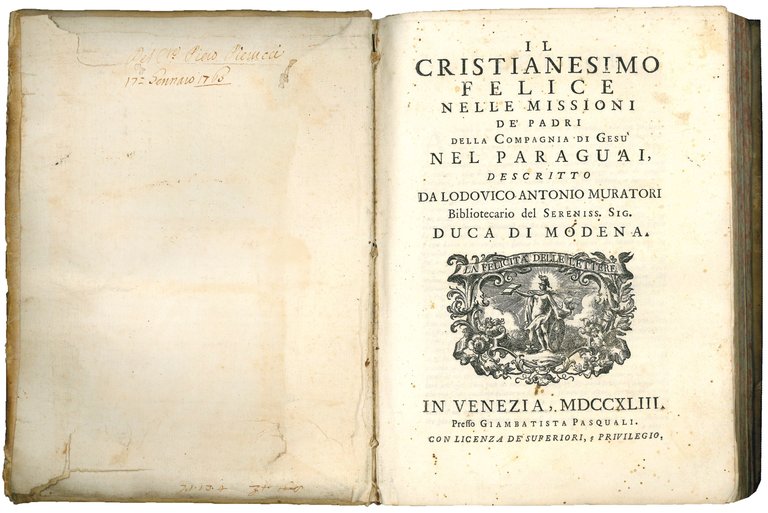
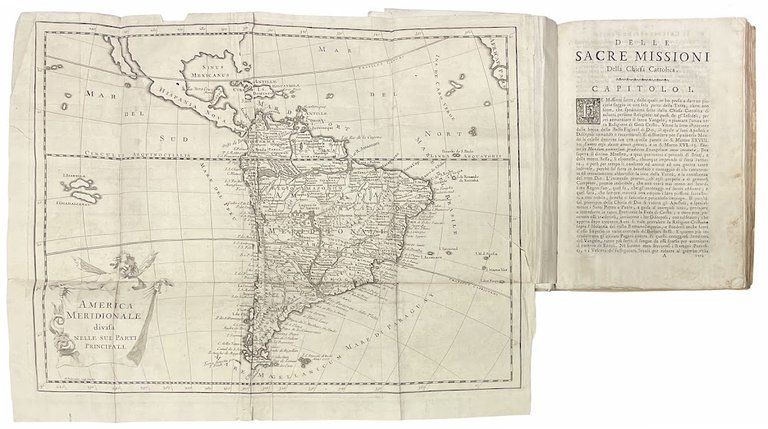
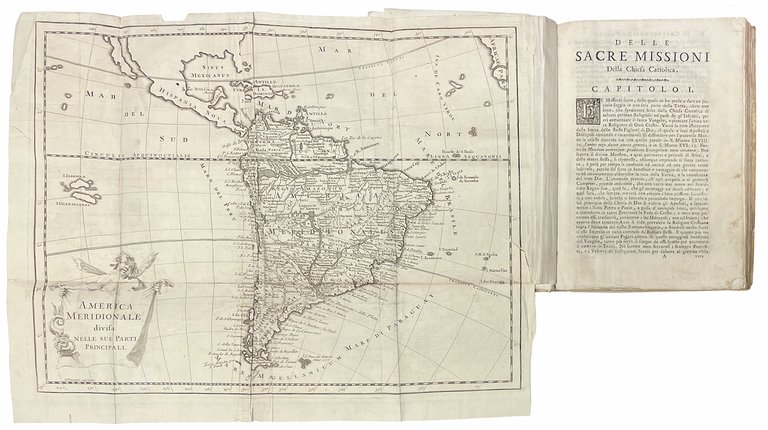
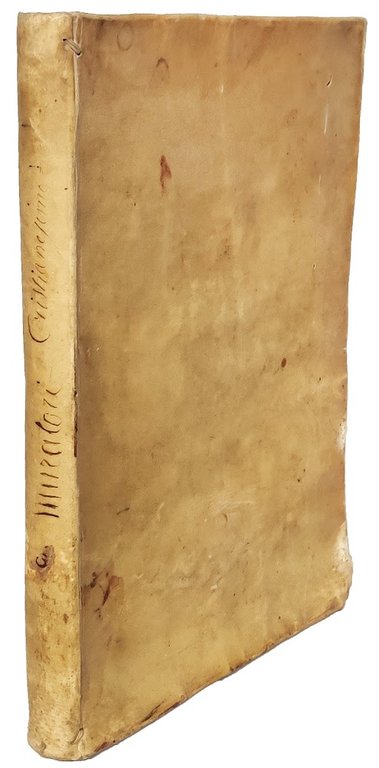
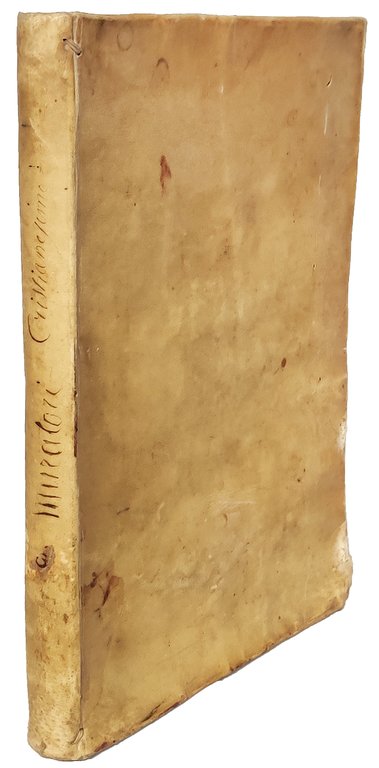
Libros antiguos y modernos
MURATORI, Ludovico Antonio (1672-1750)
Il Cristianesimo Felice nelle Missioni de' Padri della Compagnia di Gesù nel Paraguai, descritto da Ludovico Antonio Muratori Bibliotecario del Sereniss. Sig. Duca di Modena
Giambattista Pasquali, 1743
1500,00 €
Govi Libreria Antiquaria
(Modena, Italia)
Los gastos de envío correctos se calculan una vez añadida la dirección de envío durante la creación del pedido. El vendedor puede elegir uno o varios métodos de envío: standard, express, economy o in store pick-up.
Condiciones de envío de la Librería:
Para los productos con un precio superior a 300 euros, es posible solicitar un plan de pago a plazos al Maremagnum. El pago puede efectuarse con Carta del Docente, Carta della cultura giovani e del merito, Administración Pública.
Los plazos de entrega se estiman en función de los plazos de envío de la librería y del transportista. En caso de retención aduanera, pueden producirse retrasos en la entrega. Los posibles gastos de aduana corren a cargo del destinatario.
Pulsa para saber másFormas de Pago
- PayPal
- Tarjeta de crédito
- Transferencia Bancaria
-
-
Descubre cómo utilizar
tu Carta del Docente -
Descubre cómo utilizar
tu Carta della cultura giovani e del merito
Detalles
Descripción
4to (234x167 mm). [8], 196 and 1 folding engraved maps of South America. Printer's device on title page. Contemporary stiff vellum, inked title on spine, marbled edges (lacking the front flyleaf, slightly worn and rubbed). On the front pastedown manuscript ownership inscription “Del C.te Piero Pierucci 17 Gennaio 1765”. Some occasional light foxing, but a good, genuine copy.
First edition (a second part was published by Pasquali in 1749) of this “history of the missions of the Jesuit in Paraguay, where they exerted an extraordinary influence and obtained almost supreme power […] Most book on the subject are written by members of the order; but the fact that Muratori was not a Jesuit, has given his history a character of impartiality, not claimed for other authors. It was composed in great part from documents written by various Jesuit missionaries and travelers, furnished to Muratori by Father Gaetan Cattaneo, a missionary in Paraguay” (Sabin, 51418).
Added to the end of the volume are three letters addressed by father Gaetano Cattaneo (1696-1733) to his brother Giuseppe in Modena, which contain the observations gathered during his trip to the missions in Paraguay between 1729 and 1733.
In Paraguay the Jesuits created a system of small communities called reducciones (‘reductions') or ‘Jesuit republics', which had the purpose of separating and protecting the Indians from the settlers while at the same converting them to Christianism. The reduction system ended up creating a sort of utopian society that was often contrasted by the Spanish civil authorities, the settlers and, occasionally, even by the diocesan church.
Ludovico Antonio Muratori, born in Vignola to a poor family, after his early studies in Modena, took the orders and in 1695 moved to Milan as prefect of the Biblioteca Ambrosiana. Called back to Modena by Duke Rinaldo I, he was appointed court librarian and archivist. Without ever being a member of the court, he became the duke's most trusted scholar.
In Modena Muratori found the tranquility necessary to carry on and complete his ambitous work. The Duchy of Modena enjoyed at the time a certain autonomy and a sort of mediated sovereignty within the Holy Roman Imperial system. This allowed Muratori to develop a sharp pro-imperial feeling together with a strong Italian identity. Muratori's life in Modena unfolded between his priestly activity at the parish of S. Maria della Pomposa (which also resulted in devotional writings such as Della carità cristiana, 1723 and Della regolata devozione dei cristiani, 1747) and his scholarly production, extraordinary for continuity, volume and method.
Charged with supporting the arguments of the Este family over Comacchio and the Duchy of Ferrara against the Holy See, Muratori began to devote himself to the study of medieval history, the origins of the constitution of the Church State and its legal position vis-à-vis the Empire. This formed the starting point of his historical investigations. Through his work Muratori contributed greatly to the reappraisal of the Middle Ages. For his rigorous philological approach he can rightly be regarded as one of the fathers of modern historiography.
In the twenty years between 1723 and 1751 Muratori summed up the fruit of his immense historical and literary research in over fifty ponderous volumes divided among five major works: the Rerum Italicarum Scriptores (1723-1738; monumental collection of chronicles and historical documents of all kinds, both published and unpublished, on the Italian Middle Ages), the Antiquitates Italicae Medii Aevi (1738-1743), the Novum Thesaurum Veterum Inscriptionum (1738-1743), the Annali d'Italia dal principio dell'Era volgare fino all'anno 1500 (1744-1749; first major history of Italy) and the Dissertazione sopra le antichità italiane (1751).
Muratori was at the center of a dense network of correspondence, which put him in contact with all the leading European scholars of the time

